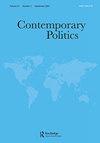FTA Motives in South Korea: is an FTA a way to increase general welfare or to meet political interest?
IF 2
3区 社会学
Q1 POLITICAL SCIENCE
引用次数: 1
Abstract
ABSTRACT This study aims to investigate South Korea’s free trade agreement (FTA) initiative with priority given to the government’s motives under the institutional structure. Two broad approaches have elaborated political leaders’ motives for making a particular trade policy. The social concerns approach assumes that trade policy reflects political leaders’ welfare concerns for the general public and its desire to achieve various national and international goals. In contrast, the self-interest approach presumes that political leaders tend to support a particular trade policy depending on whether the policy increases or decreases their real political incentives. By investigating structural changes of the FTA agency in South Korea, this study found that FTA motives work in different ways under different institutional structures.韩国自由贸易协定的动机:自由贸易协定是增加总体福利还是满足政治利益的一种方式?
摘要本研究旨在调查韩国在体制结构下优先考虑政府动机的自由贸易协定(FTA)倡议。两种广泛的方法阐述了政治领导人制定特定贸易政策的动机。社会关切方法假定贸易政策反映了政治领导人对公众的福利关切及其实现各种国家和国际目标的愿望。相比之下,利己主义方法假设政治领导人倾向于支持特定的贸易政策,这取决于该政策是增加还是减少了他们的实际政治动机。通过对韩国自由贸易协定机构结构变化的调查,本研究发现,在不同的制度结构下,自由贸易协定动机以不同的方式发挥作用。
本文章由计算机程序翻译,如有差异,请以英文原文为准。
求助全文
约1分钟内获得全文
求助全文

 求助内容:
求助内容: 应助结果提醒方式:
应助结果提醒方式:


